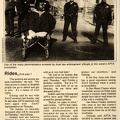The Orlando Sentinel Local & state B
TUESDAY, October 8, 1991
[This clipping contains two articles. Artilce 1, titled Q & A is a boxed insert. It is continued on a page that are not currently available. Article 2 continues in ADAPT 686 but the entire text of the article is included here for easier reading.]
Main Title: Disabled protesters refuse to attend talks
Article 1 -
Title: Q&A
no author given; Lauren Ritchie is interviewer.
Mike Auberger discusses why the group of disabled people that he helped organize is protesting the meeting of the American Health Care Association. Auberger was interviewed Monday from his cell at the Orange County Jail by Lauren Ritchie.
Question: Why is ADAPT targeting nursing home operators?
Answer: The nursing home industry is a $50 billion a year organization. lf you happen to be 30
years old and disabled and live, say, in Ocala —— and there are no personal assistance programs —
than you're forced into a nursing home simply because you have physical needs you can't take care of yourself.
Q: Why, from your perspective, is that bad?
A: If you've ever talked to anybody who's been in a nursing home, the only difference between there and jail is the color of the uniforms. The jail uses guns to keep you there; the nursing home uses pills.
You have no choice about when you get up, what you wear, what you eat or don't eat and when you go to bed. When we talk about nursing homes, we talk in terms of incarceration. You never escape from a nursing home. lf you are older and disabled, you could be forced to sell your home, forced to give up everything. The issue is quality of life. Most people can be taken care of in their own homes.
Q: Why does ADAPT focus on nursing homes rather than the federal goverment?
A: Under the Medicaid program, each state is required to participate in nursing home funding [for the disabled]. Every time a state does a budget it has to identify a certain amount of dollars for nursing homes. If you ... please see Q & A, B-4
Article 2
Photo by Red Huber/Sentinel: The picture is divided almost down the middle by a line of police barricades. On the left side a row of uniformed police officers stand leaning forward, arms stiff, holding the barricades in place. On the right a line of ADAPT protesters (San Anontio Fuentes closest to the camera) face off with the police. Behind them several standing people look on.
Caption: A steel barricade and a line of Orange County deputy sheriffs prevent protesters from reaching the doors at the convention center.
Title: Deputies expect the protests will grow worse when famous speakers address the convention.
By Mary Brooks, of the Sentinel Staff
Disabled activists demonstrating at a convention of nursing home operators rejected an offer to meet with industry leaders Monday, calling it a ploy to end their protest.
But a spokeswoman for the American Health Care Association, which is playing host to 3,500 people at its annual conference in Orlando, said members of ADAPT -- Americans Disabled for Attendant Programs - seemed more interested in drawing television cameras than in drawing up an agreement at a discussion table.
Activists say they plan to continue trying to block entrances to the Orange County Convention and Civic Center until the conference ends Thursday.
Deputies expect the worst will come during the visits of the convention's noted speakers. This morning, Red Cross president Elizabeth Dole will address the convention. Television weatherman Willard Scott is scheduled to speak Wednesday.
In their second day of demonstrations Monday; about 120 ADAPT members clustered near the three main entrances to the convention center on International Drive. They were barred from approaching the center doors by portable steel fences and 130 Orange County deputy sheriffs.
"In the past they've blocked entrances with chains. We want to prevent that," said sheriff's spokesman Cpl. Doug Sarubbi. “They have a right to be here, but the conference attendees have a right to be here. too."
Two protesters were arrested late Monday after they refused to stop using a loudspeaker. The protesters, many of them in wheelchairs and a few with guide dogs, sang, chanted and shouted at convention-goers. Tension mounted for several minutes when some of the disabled rammed their wheelchairs into the barricades. There were no injuries.
Organizers said the 74 protesters arrested in clashes with deputies on Sunday at the Peabody Hotel on International Drive would not post bond and would remain in the Orange County Jail.
Pat Hasley, a hotel security guard who suffered a heart attack during Sunday’s demonstration, was in stable condition Monday at Sand Lake Hospital.
Denver-based ADAPT wants Medicaid to funnel 25 percent of the $23 billion nursing home budget to home care for the disabled. The group also wants the chance to address convention participants.
“Right now, if you're disabled and need medical services and can’t afford it, they’re going to lock you up" in a nursing home, said Stephanie Thomas, an ADAPT organizer.
Demonstrators claimed that 1.6 million disabled people in nursing homes really shouldn’t be there.
“We don’t think the extreme needs of a very small percentage should dictate where all the money goes,” said Molly Blank, an organizer from Denver.
During about four hours of protest Monday, some convention-goers stood outside the center to watch. Ralph Frasca of Cedar Falls, Iowa, and Mary Scheider of Joliet, Ill., were among a few who ventured over to talk to the demonstrators.
“They have a legitimate grievance,” Scheider said. “The main issue is at-home care, diverting funding from institutional care to home care. The funding system now is skewed toward institutional care."
Frasca, a journalism professor at the University of Northern lowa, said many convention participants were tumed off by ADAPT’s approach. “The discussion thus far has not centered around issues but rather the sensationalism of the event. I think a non confrontational, peaceful dialogue should be taking place."
Linda Keegan, a spokeswoman for the American Health Care Association, said the demonstration did not disturb the convention activities. She said ADAPT had not contacted the association about a meeting or about getting time on the convention agenda before Sunday.
She said the health care association’s executive board has met with the group twice this year, each meeting ending in chaos. “We made a commitment to meet. They made a commitment to protest.”
The association proposed on Monday to meet with ADAPT on Thursday under the condition that the activists stop protesting.
“We don't think that is a good faith offer," said Thomas.
The Sheriffs Office and the jail had made extensive preparations for handling the disabled protesters, including special training and added staff. Sarubbi said the Sheriff's Office would not know what the cost would be until the demonstrations are over.
Ed Royal, an Orange County Jail administrator, said volunteers from jail ministries were helping to defray some of the costs of handling the disabled inmates. The jail also had to get foam mattresses, diapers, chargers for wheelchair batteries, and other special equipment.
The problems of caring for the protesters are many, Royal said. Staff and volunteers had to document and administer medication, and to help inmates relieve, bathe and feed themselves. Jail officials were able to make trades for some supplies with hospitals, but other materials had to be bought.
Monday morning, 37 jailed activists began refusing food and liquids and another 10 would not eat but were drinking. Medical staff were monitoring the hunger strikers and were prepared to take them to hospitals if needed, said Royal.
On its lawyers’ advice, the corrections department has been videotaping the disabled inmates since their arrival. "They have a history of saying they were mistreated while in custody, so we're taking no chances," said Royal.
- Author
- Orlando Sentinel/Lauren Ritchie / Mary Brooks /photo by Red Huber
- Created on
- Friday 12 July 2013
- Posted on
- Thursday 29 November 2018
- Tags
- ADAPT - American Disabled for Attendant Programs Today, AHCA - American Health Care Association, arrest, bullhorn, confrontation, convention center, cost, court, Elizabeth Dole Red Cross, hunger strike, institutional bias, jail, jail preparations, Medicaid, meeting with AHCA, Mike Auberger, Molly Blank, nursing home entitlement, nursing home industry, police barricades, police preparations, quality of life, redirect 25%, San Antonio Fuentes, sheriff's deputies, Stephanie Thomas, Willard Scott
- Albums
- Visits
- 2143
- Rating score
- no rate
- Rate this photo


0 comments